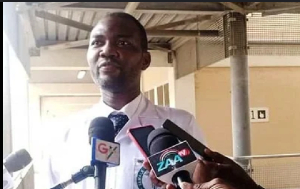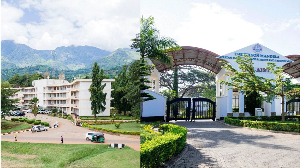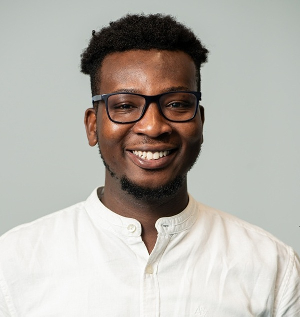I was indeed taken aback when I heard former President Mahama on radio on Friday 22nd February 2019, gleefully describing President Akufo-Addo as the father of the militant vigilantism in contemporary Ghanaian politics.
Apparently, President Akufo-Addo’s prudent and somewhat innocuous directive during the recent State of the Nation Address (SONA)to the respective owners of the ‘militant groups’ to come together and disband such groups necessitated the obvious disingenuous response from the former president.
Let us however be honest, the apparent hypocrisy and dishonesty being displayed by the NDC loyalists is mind-boggling.
Dearest reader, it is quite ironic that the NDC faithful have soon forgotten their history, or should I say their ideology?
“If you would look deeper, history is broad yet deep that binds the core existence of the world. Hence, history keeps the records of events that happened (Hughes 2010).”
In any case, I feel duty bound as a bona fide Ghanaian to offer free remedial history tutorials to the uninitiated and the younger generation.
In fact, contending schools of thought have it that it was the founders of the NDC who crudely introduced militant vigilantism into contemporary Ghanaian politics.
It has been well-stencilled that in a desperate attempt to hold on to their illegitimate power, the founders of the NDC set up various paramilitary organs such as People’s Defence Committee (PDC), the Civil Defence Organisation (CDO), which was popularly known as the Militia, and the Workers Defence Committee (WDC), where the last two organs were later reorganised and renamed as the Committee for the Defence of the Revolution (CDR), whose collective mandate was to defend the revolution by hook or by crook.
“The PDCs and the WDCs (Workers Defence Committees) had their own courts and "meted out justice according to no established legal procedures” [Amnesty International, 1983).
So, some of us who were old and fortunate enough to have witnessed the revoltingly ugly events which took place over a period of three decades (1970-1990s), cannot be hoodwinked and proselytised by the supposedly exponents of probity, transparency and accountability.
If we stroll down memory lane, General I. K. Acheampong led a group of disgruntled soldiers and usurped Prime Minister Dr Kofi Abrefa Busia’s government in 1972.
The mutinous coup makers adopted a taxonomic nomenclature for their government-The Supreme Military Council (SMC).
Nevertheless, in 1978, General Acheampong was accused of economic mismanagement and forced to resign by a group of army officers led by General Akufo.
Subsequently, General Akufo and his rabble rousers renamed the government as the Supreme Military Council 2 (SMC2).
It is, however, worth emphasising that the harsh living conditions at the time prompted a group of patriotic citizens to rightly stand up against the injustices and demanded a democratic rule.
But before the country could reach a consensus on the question of civilian rule, a group of disgruntled junior army officers led by Flight Lieutenant Jerry John Rawlings, who was later to become the founder of the NDC, revolted against General Fred Akuffo’s SMC2 regime on 15th May 1979.
However, the cabals failed in their insurrection, which culminated in the arrest and trial of Rawlings and his cohorts.
Suffice it to state that the judicial process was halted prematurely by a group of soldiers sympathetic to Rawlings, who revolted on 4th June 1979.
The rebellious soldiers (mobsters) broke jail and released Rawlings and his cohorts from a lawful custody.
After successfully deposing General Akuffo and his Supreme Military Council2 (SMC2) government, the stubbornly impenitent jailbreakers went ahead and formed their own government, which they called as the Armed Forces Revolutionary Council (AFRC) and appointed Flt. Rawlings as their chairman.
Rawlings and his friends vowed to purge off the rampant sleazes, corruption and social injustices which instigated their coup d’état.
So in their attempt to lustrate the country of the perceived injustices, they carried out what they termed “house cleaning exercise”,--they dealt with perceived offenders arbitrarily (instant justice was the order of the day).
It is worth stressing that the mutinous coup makers proceeded with their intentions and callously exterminated eight prominent officers, whom they accused of committing sleazes and corruption without trial.
The Officers included General Fred Akuffo, General Kutu Acheampong, General Akwasi Afrifa , amongst others.
The coup makers transferred power to Dr Hilla Limann and his PNP Party following the successful election in 1979.
Disappointingly, however, Rawlings and his cohorts did not give Dr Liman and his PNP government the breathing space to govern the country, as they relentlessly breathed down the neck of President Liman.
As a matter of fact, Rawlings and his conspiratorial plotters unfairly kept criticising Dr Limann’s administration for what the coup makers perceived as economic mismanagement, until Rawlings and his jailbreaking geezers decided to depose Dr Limann.
Subsequently, J.J. Rawlings and the other obstreperous jailbreakers took arms and succeeded in deposing the democratically elected government of Dr Hilla Limann on 31st December 1981.
Rawlings and his vigilante friends formed a government which they called the Provisional national Defence Council (PNDC) and appointed Rawlings as the chairman.
In their weird attempt to get rid of alleged sleazes and corruption, many Ghanaians were unjustifiably murdered or tortured mercilessly for apparent infinitesimal offences.
Some market women were regrettably stripped naked in the public and whipped for hauling their products or selling on high prices. While their male counterparts were wickedly shaved with broken bottles and whipped for offences that would not even warrant a Police caution in a civilized society.
As if that was not enough, three eminent High Court Judges and a prominent Army Officer were barbarically murdered by some mindless militants of PNDC on 30th June 1982 for carrying out their constitutionally mandated duties.
“June 30th 1982 continues to remain a dark spot in the nation’s political history and a nightmare for all judges in the country, after the three High Court Judges namely, Mr. Justice Fred Poku Sarkodie, Mrs. Justice Cecilia Koranteng- Addow and Mr. Justice Kwadwo Agyei Agyapong as well as a retired army officer, Major Sam Acquah, were callously murdered under strange circumstances at the Bundase Military Range in the Accra Plains, after being abducted on the night by some unidentified assailants (rawafrica.com).”
Subsequent investigations revealed that all the three Judges were sitting on review cases brought by citizens disgusted over the treatment meted out to them by the Armed Forces Revolutionary Council which the military junta formed after June 4, led by Flt. Lt. Rawlings.
It was reported that the Judges ordered the release of persons who had been unlawfully sentenced to long terms of imprisonment during the despotic rule of the Armed Forces Revolutionary Council (AFRC).
The Army Officer, Major Sam Acquah, was the head of administration who signed dismissal letters for some GIHOC workers, including one of the murder suspects, Joachim Amartey Kwei, whose services were terminated for invading and destroying property at the Parliament House.
Consequently, the PNDC fatuous apologists savagely murdered the three eminent High Court Judges and the Army Officer because their judgement did not go in their favour.
The Special Investigation Board (SIB) however concluded that the abduction and murder was a fiendish plot orchestrated by, and with the connivance of the members of the Provisional National Defence Council.
The story however is told, albeit factually, that in their desperate attempts to defend their illegitimate power and lay the foundation for a supposedly true democracy in Ghana, the PNDC regime created a controversial countrywide network of People's Defence Committees (PDCs) and Workers' Defence Committees (WDCs), reorganised and renamed, in late 1984 as Committees for the Defence of the Revolution (CDRs).
The CDRs were established in villages, urban communities, and workplaces and intended to be the organs of popular power and political initiative.
In addition, Forces' Defence Committees were established in the armed forces and the police service.
The most important aspect of the reorganization of the PDCs and the WDCs from the standpoint of the political and socioeconomic functions of the CDRs was the opening up of membership to all Ghanaians.
This decision reversed the earlier exclusion from PDC/WDC membership of elite groups, such as chiefs and so-called exploiting classes. The change returned the revolution to its original objective of involving all Ghanaians in decision making and opened up possibilities for genuine national reconciliation.
According to official directives, the principal functions of the CDRs were to ensure democratic participation in decision making in all communities and workplaces; to guard against corruption, abuse of power, sabotage, and social injustice; and to promote sustained national productivity by focusing efforts on the productive sectors of the economy.
The other mass organizations of the revolution were the National Mobilisation Program, the 31st December Women's Movement, the Civil Defence Organisation (the militia), the National Youth Organising Commission, and the June Four Movement.
The National Mobilisation Program started as an emergency programme to receive and resettle Ghanaian returnees from Nigeria in 1983. It soon developed into a cooperative movement engaged in a variety of economic and community development projects throughout Ghana.
The 31st December Women's Movement, according to the coup makers, aimed to bring about the political, social, and economic emancipation of Ghanaian women, especially rural women.
The Civil Defence Organisation, popularly known as the militia, was set up as a paramilitary institution to assist other state organizations in national emergencies such as invasions, bush fires, and floods. Members received special training in combat readiness to defend the nation against internal and external aggression and economic sabotage.
The militia, in addition to claiming to combating crime in local communities, engaged in voluntary social and economic activities to help promote community development. In this effort, it was often assisted by the National Youth Organising Commission, created in 1982 as part of the PNDC's efforts to establish a youth movement to carry out the objectives of the 31st December 1981 Revolution.
The June Four Movement was a militant mass revolutionary movement dedicated to keeping alive the ideals of the June 4, 1979, uprising that Rawlings had led. It sought to arouse the population at large to assist in establishing so-called people's power within the avowed objectives of the revolutionary process.
On a practical level, it worked with the militia and the National Youth Organising Commission in various community development projects.
Participatory opportunities of the ordinary Ghanaian citizen were significantly expanded through membership in revolutionary organs.
Before the establishment of the district assemblies in 1989, the PNDC government was able to reach the rural population and to broaden its base of support by direct consultation.
This was achieved through chiefs, the CDRs, and other national bodies such as the Democratic Youth League of Ghana, which in 1988 claimed a nationwide membership of more than 100,000. Other such groups included farmers' organizations, market women's associations, trade union groups, students' organizations, and religious and other bodies.
The PNDC's political opposition back then, however, vehemently contested the democratic nature of such organs and saw them as nothing but state-sponsored vigilantes engaged in intimidation and human rights abuses (Source: U.S. Library of Congress).
It was rumoured that when Ghana returned to democratic rule in 1993, some members of the paramilitary groups who could not get the opportunity to join any of the security services bolted with their guns.
Consequently, armed robberies and other heinous crimes increased exponentially in the early days of the Fourth Republic in 1993. Unfortunately, however, the armed robbery menace has continued unabated.
And, we have regrettably sat idly over the years and allowed the boisterous homicidal brats and other ill-motive paramilitary groups to cause havoc to innocent Ghanaians.
In the light of the above exposition, it would be hypocritical on the part of anyone who attempts to put all the blame on the NPP Party with regard to the creation of vigilante groups in the Ghanaian politics.
K. Badu, UK.
k.badu2011@gmail.com
References: www.ghanapoliticsonline.com
www.ghanaweb.com
Amnesty International (1983), ‘Amnesty International's Concerns in the Republic of Ghana: An Amnesty International Background Paper. London: AI
U.S. Library of Congress (2017), ‘Ghana: The Revolutionary Organs’, (online). Available: countrystudies.us/Ghana/93.htm
Rawlings, J. J. (2017), ‘June 4 Full Speech, (online). Available: www.starrfmonline.com
Badu, K. (2017), ‘Bongo MP, It Was The NDC That Came Out of Coup d’états’, (online). Available: www.ghanaweb.com
Opinions of Sunday, 24 February 2019
Columnist: Kwaku Badu















